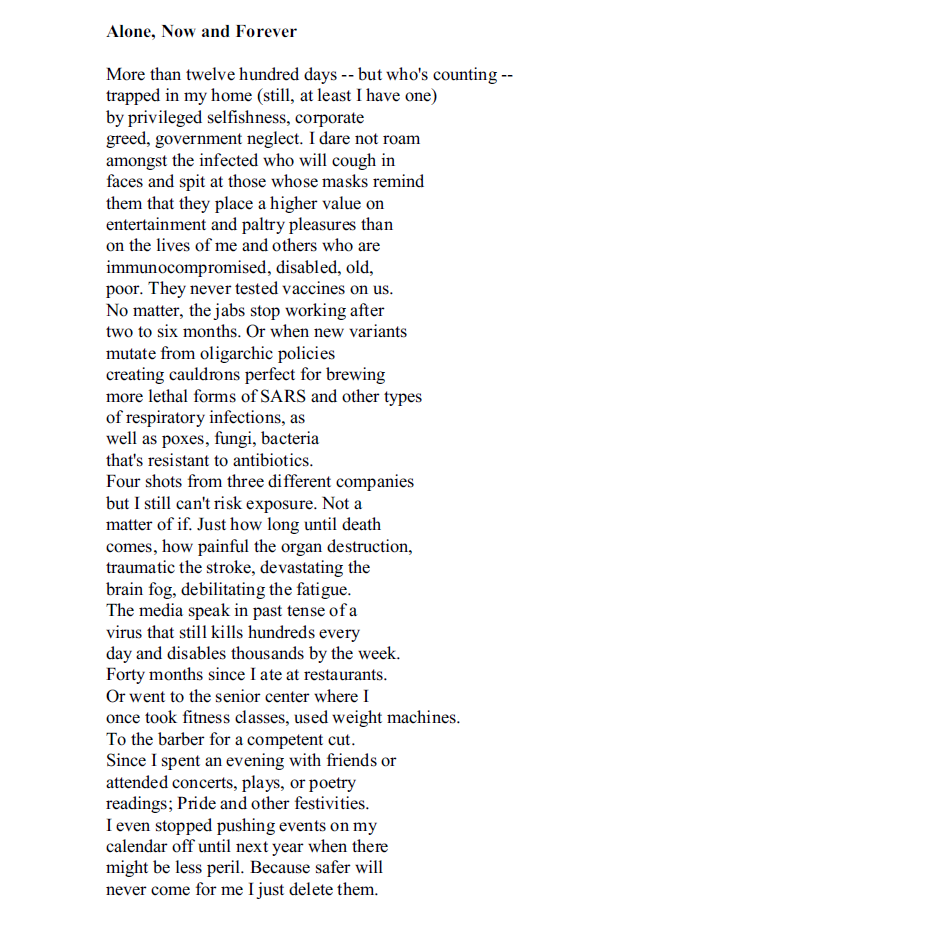Audio Story by Jean
English Translation
About during the COVID time, it was a — that time it was hard. We had to stay home, and you — we couldn’t go to school, couldn’t go to work, and we just stay home. So that affected how we lived. Our way to live was hard. So we, so we had not enough money to pay for rent, for food because we are not going to work. So like by myself also got sick. It was not too dangerous, but I got sick. I went to clinic to get — I got sick, but I couldn’t go to the hospital to get the medication because it was not [indistinct]. I just use like a — like a traditional way, like having like a traditional way like of like, um, lemon and like onions, onions and honey. We put all of them together to fight this COVID that was coming to me. So yeah. So also because it was harder to go to work. Yeah. Also, what else? Also COVID — also we couldn’t fly. Yeah, I remember I had in that time I wanted to go to visit my girlfriend who lived in Wisconsin, but at that time I couldn’t go because of COVID, so it was a bad time. Also I heard people died all over the world. I heard the news that other people are dying. Some superstars, people we knew — we knew died. Yeah. Yeah. So many people died. Yeah. So yeah. So that’s all I can say about COVID. But we are so thankful that the pandemic went away, and now we are safe. We are so happy for that. So yeah.
Spanish Translation
Con respecto a la época del COVID, fue… fue un tiempo difícil. Teníamos que quedarnos en casa, y… no podíamos ir al escuela, no podíamos ir a trabajar, solamente nos quedábamos en casa. Y eso afectó nuestro modo de vivir. Nuestro modo de vida era difícil. No teníamos dinero suficiente para pagar el alquiler, para la comida, porque no estábamos yendo a trabajar. Y entonces estaba por mi cuenta y también me enfermé. No fue demasiado peligroso, pero me enfermé. Fui a la clínica para buscar… Me enfermé, pero no podía ir al hospital a buscar los medicamentos porque no [interferencia]. Fue como… como un modo tradicional, como tener un modo tradicional, como limón y cebollas, cebollas y miel. Pusimos todo junto para luchar contra este COVID que me estaba atacando. Así que sí. Y también porque era más difícil ir a trabajar. Sí. También, ¿qué más? También el COVID… y no podíamos volar. Sí, me acuerdo que en ese tiempo quería ir a visitar a mi novia que vivía en Wisconsin, pero no podía ir por el COVID, así que fueron tiempos muy malos. También escuché que moría gente en todas partes del mundo. Escuché las noticias de que otras personas estaban muriendo. Algunas superestrellas, personas que conocíamos, murieron. Sí, sí. Tanta gente murió. Sí. Así que sí. Y eso es todo lo que puedo decir acerca del COVID. Pero estamos tan agradecidos porque la pandemia se fue, y que ahora estamos seguros. Estamos tan felices por eso. Así que sí.
Swahili Translation
Mathalani kipindi cha mlipuko wa COVID, kulikuwa — kipindi kile kilikuwa kigumu. Tulibidi kukaa nyumbani, nanyi — hatukuweza kwenda shuleni wala kazini, na tulikaa tu nyumbani. Hivyo hilo liliathiri namna yetu ya kuishi. Maisha yetu yalikuwa magumu. Hivyo, hatukuwa na pesa ya kutosha kulipia kodi wala chakula kwa sababu hatukwenda kazini. Mimi pia niliugua. Hatari haikuwa kubwa sana, hata hivyo niliugua. Nilienda kliniki kupata matibabu — Niliugua, lakini sikuweza kwenda hospitali ili kupata matibabu kwa sababu haikuwa [msikiko hafifu]. Nilitumia tu — njia ya kitamaduni, kama vile kutumia njia ya kitamaduni kama ile ya, eeh, malimao na vitunguu na asali. Tulichanganya vitu hivyo vyote pamoja kupambana na gonjwa hilo la COVID lililokuwa limenikumba. Ndio hivyo. Lakini pia ni kwa sababu ilikuwa ngumu kwenda kufanya kazi. Ndio. Na, nini kingine? Pia kutokana na COVID — hatukuweza pia kusafiri kwa njia ya anga. Ndio, nakumbuka kipindi kile nilitamani kwenda kumtembelea mpenzi wangu aliyekuwa anaishi huko Wisconsin, lakini nilishindwa kutokana na COVID, hivyo mambo yalikuwa mabaya sana kipindi hicho. Pia nilisikia kwamba watu pande zote za dunia walipoteza maisha. Nilisikia kwenye taarifa ya habari kwamba watu walikuwa wanafariki. Baadhi ya watu hao wakiwa watu maarufu, watu tuliokuwa tunawafahamu — tulitaarifiwa kuwa walipoteza maisha. Ndio. Ndio. Watu wengi sana walifariki. Ndio. Ndio hivyo. Hivyo hayo tu ndio ninayoweza kuyasema kuhusiana na COVID. Hata hivyo, tunashukuru kwamba janga hilo kubwa limekwishakupita, na sasa tu salama. Jambo hilo latufurahisha sana. Ndio hivyo.
